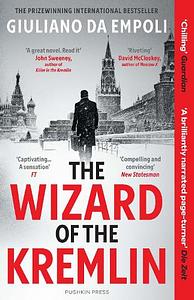Take a photo of a barcode or cover
dark
informative
fast-paced
Plot or Character Driven:
Character
Strong character development:
Yes
Loveable characters:
No
Diverse cast of characters:
Complicated
Flaws of characters a main focus:
Yes
suis très déçue, j'avais beaucoup d'attentes mais merci aux 25 dernières pages
mysterious
reflective
tense
medium-paced
Plot or Character Driven:
Character
Strong character development:
Yes
Loveable characters:
Complicated
Diverse cast of characters:
No
Flaws of characters a main focus:
No
Citation du livre : “La vérité c'est que, même quand je me suis approché du sommet du pouvoir, je n'ai pas cessé d'être marginal. Au fond, je crois, une fois encore, que c'est la faute de la bibliothèque de grand-père. Elle m'a donné la conscience de ne pas être au centre du temps. Aussi excitante soit-elle, notre époque n'est que l'énième version de la comédie dont les infimes variations se déploient au cours des siècles. « De temps en temps un homme se dresse dans le monde, fait étalage de sa fortune et proclame : c'est moi! Sa gloire vit le temps d'un rêve interrompu, déjà la mort se dresse et proclame : c'est moi. »”
I've read a handful of books lately that attempted to explain why Russia invaded Ukraine, or in the case of older books why Russia had acted so aggressively in its 'Near Abroad' in the last two decades.
The strongest (and most common) arguments centre on Russian resentment of the post-Cold War era: Russia's lost status (and empire), American triumphalism, and Western enthusiasm for liberal military interventions in the Balkans, Middle East, and North Africa. Moscow went very quickly from being the capital of a global superpower, to being told to get to the back of the queue for membership western institutions, alongside little Georgia and Moldova.
But compared to more rationalist explanations, such as Mearsheimer's (and many Russians') claim that Russia has merely responded predictably to an unnerving NATO expansion to its borders, these 'resentment' explanations feel a little unsatisfying. I could grasp the NATO argument intuitively (even if it's nonsense): Brits wouldn't much appreciate Chinese or Russian forces being based in Ireland, for example.
By contrast, the strength of feeling that Russia has been mistreated, and must therefore create this very aggressive and expensive foreign policy to rectify this feeling (rather than to make the country wealthier or more secure) isn't very intuitive to those that don't and can't feel it. Realism translates perfectly well between political cultures, but subjective feelings of injustice less so - how *could* the Russians be so upset about Kosovo, for example?
What this book does, more than any work of non-fiction, is share this resentment with the reader, in the first person. Da Empoli builds this intuition of Russian resentment. We feel his, Putin's, and his country's humiliations at various stages of the book, mostly in ways that would be imperceptible to Western senses. It all begins to make a little more sense, and to the writer's credit, this from a book written *before* the 2022 invasion.
The strongest (and most common) arguments centre on Russian resentment of the post-Cold War era: Russia's lost status (and empire), American triumphalism, and Western enthusiasm for liberal military interventions in the Balkans, Middle East, and North Africa. Moscow went very quickly from being the capital of a global superpower, to being told to get to the back of the queue for membership western institutions, alongside little Georgia and Moldova.
But compared to more rationalist explanations, such as Mearsheimer's (and many Russians') claim that Russia has merely responded predictably to an unnerving NATO expansion to its borders, these 'resentment' explanations feel a little unsatisfying. I could grasp the NATO argument intuitively (even if it's nonsense): Brits wouldn't much appreciate Chinese or Russian forces being based in Ireland, for example.
By contrast, the strength of feeling that Russia has been mistreated, and must therefore create this very aggressive and expensive foreign policy to rectify this feeling (rather than to make the country wealthier or more secure) isn't very intuitive to those that don't and can't feel it. Realism translates perfectly well between political cultures, but subjective feelings of injustice less so - how *could* the Russians be so upset about Kosovo, for example?
What this book does, more than any work of non-fiction, is share this resentment with the reader, in the first person. Da Empoli builds this intuition of Russian resentment. We feel his, Putin's, and his country's humiliations at various stages of the book, mostly in ways that would be imperceptible to Western senses. It all begins to make a little more sense, and to the writer's credit, this from a book written *before* the 2022 invasion.
Tout a été dit sur ce roman, c'est magistral . Je l'ai écouté de nombreuses heures, il est parfaitement écrit et parfaitement lu. C'est un livre de conversations glaciales sourcils froncés, un roman sombre au possible, cynique et sans issue. Bref une réussite dans l'analyse et l'écriture, davantage accessible et grand public que je le pensais, notamment parce que le narrateur garde une distance salvatrice, mais ça reste pour moi une lecture oppressante que je suis contente d'avoir terminée. Je pense que tout à l'intérieur est pertinent et sans doute réel, d'ailleurs parfois, ponctuellement, il n'évite pas l'écueil de l'essai déguisé en roman. Cela rajoute à mon désespoir.
An interesting view of the modern political context of Russia.
The book was well written and straight to the point.
The book was well written and straight to the point.
informative
mysterious
reflective
tense
medium-paced
Plot or Character Driven:
Character
Strong character development:
Yes
adventurous
dark
informative
inspiring
mysterious
tense
medium-paced
Plot or Character Driven:
Character
Strong character development:
Yes
Loveable characters:
Yes
Diverse cast of characters:
No
Flaws of characters a main focus:
Complicated
informative
slow-paced
Plot or Character Driven:
Character
Strong character development:
No
Loveable characters:
Complicated
Diverse cast of characters:
Yes
Flaws of characters a main focus:
No

